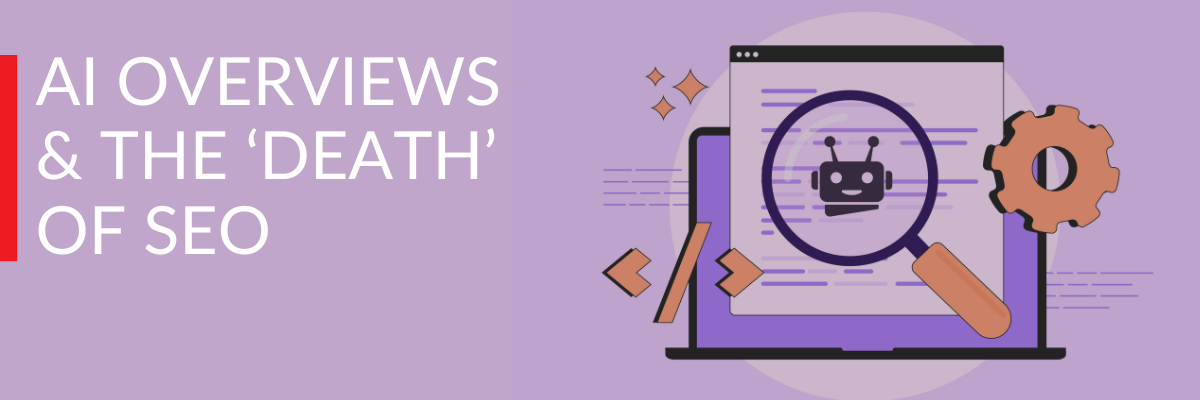Search is changing, fast. In 2024, Google launched AI Overviews (AIOs), its most significant search update in over a decade. These AI-generated summaries now dominate the top of many search results, providing instant answers to users and radically altering how websites attract traffic.
At the same time, platforms like ChatGPT, Claude, Gemini, and Perplexity are becoming mainstream search alternatives, reshaping the way people discover information. If you're still relying on traditional SEO tactics alone, you're already behind.
Let's explore how AI Overviews are transforming organic marketing, what this means for your SEO strategy, and how brands can stay visible in an increasingly AI-powered search environment.
What Are AI Overviews?
AI Overviews are Google's generative summaries that appear at the top of search results. Unlike Featured Snippets, which pull from a single source, AIOs combine insights from multiple pages to create a comprehensive answer.
Key Features;
- Appear above organic listings and even above ads
- Deliver multi-source summaries instead of single-page snippets
- Reduce the need for users to click through
- Display fewer source links than the traditional '10 blue links'
AIOs are designed to keep users in the search experience, which means your website might never get the click, even if you're the source of the information being displayed.
Why Did Google Introduce AI Overviews?
After ChatGPT's explosive popularity in 2022, Google sounded the alarm. Internally labelled a 'Code Red', the company fast-tracked the integration of generative AI into its core search experience.
- March 2023 - Launch of Bard (now Gemini)
- May 2023 - Search Generative Experience (SGE) testing
- Early 2024 - Global rollout of AI Overviews
Generative AI has now firmly established itself as Google's main competitor. AI Overviews are its response.
Where Do AI Overviews Show Up?
Currently, AI Overviews;
- Appear in 20% of all searches
- Appear in over 50% of informational queries
- Rarely appear in local or transactional searches
This means that if your website's content is educational or top-of-funnel (TOFU), you are more likely to be impacted by this shift.
The Bigger Trend: Organic Marketing Has Evolved
Alex Birkett, CEO of Omniscient Digital, points to three forces reshaping organic marketing in the AI era.
1. AI-Fueled Content Explosion
The cost of content creation has dropped dramatically, leading to an oversupply of generic, low-value content. Large Language Models (LLMs) summarise this type of content easily, reducing its impact.
2. Rising Quality Expectations
Search engines and AI tools now prioritise original, high-value insights. If your content isn’t unique, it won’t surface.
3. Reduced User Friction
Users get answers directly from AI tools, meaning clicks are no longer the end goal. Trust signals and brand authority now drive visibility.
What This Means for Marketers
1. Prepare for More Zero-Click Searches
The job of SEO content is no longer just to rank, it's to be part of the answer. This means that compelling, unique content is more important than ever.
2. E-E-A-T Signals Matter More
Google and AI models favour:
- Experience, Expertise, Authoritativeness, Trust
- Structured content with bullet points, subheadings, and FAQs
- Author bios, citations, and source credibility
3. SEO Fundamentals Still Count
The core principals of good SEO remain valuable. Top ranking content is more likely to be cited in AIOs. Keep investing in;
- Keyword optimisation
- High-value backlinks
- Fast-loading, mobile-friendly sites
- Clean technical SEO
4. Focus on Proprietary Data
Create content that AI tools can’t generate from existing web content. This includes;
- Original surveys
- Customer insights
- Market benchmarks
5. Brand Mentions Are the New Backlinks
AI models surface brands mentioned across trusted sites, forums, and third-party platforms. Build your reputation in:
- Reddit threads
- LinkedIn posts
- YouTube videos
- Industry-specific blogs
6. Think 'Search Everywhere'
Google is no longer the only place users look to when searching for information. Think of other channels such as;
- TikTok
- YouTube
- AI tools like ChatGPT and Perplexity
You need visibility on every platform where your audience seeks answers.
Your New AI-Optimised Organic Playbook
In order to stay competitive with the changing SEO landscape, be sure to;
- Audit your AI visibility: Tools like Peak.ai or Profound help identify brand citations (or lack thereof) in AI-generated content.
- Create net-new content: Prioritise insights, comparisons, and POVs that can’t be easily scraped or summarised.
- Double down on credibility: Include bios, cite your sources, and publish on respected platforms.
- Structure for AI: Use clear headings, lists, and schema markup. Make your content easy to summarise — but hard to replace.
- Monitor your performance: Track whether you're being cited in AIOs and adjust your strategy accordingly.
Looking Ahead
AI Overviews are just the beginning, but this isn't something that we should fear. SEO isn’t dead, but it's no longer about keywords and backlinks alone. It's about visibility, trust, and differentiation in a world where AI mediates almost every search experience.
Our DMI Pro Digital Marketing Course covers everything today’s marketers need to know, from core SEO strategy to cutting-edge AI tools like ChatGPT, Gemini, and Google’s AI Overviews.
Whether you're looking to future-proof your skills or drive serious organic growth in this new search landscape, this course will give you the hands-on training and certification to do it.






